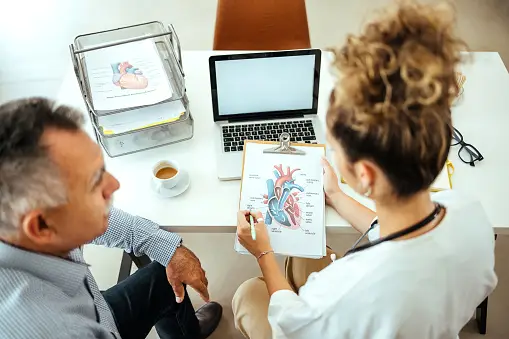Although cholesterol is essential for the body’s ability to produce new cells, synthesise hormones, and shield neurons, an excess of low-density lipoprotein, or LDL, also referred to as bad cholesterol, can be detrimental to heart health. In essence, the human liver is responsible for producing cholesterol within the body. But in addition to the liver, eating foods derived from animals (such as eggs, meat, milk, and more) also causes your body to produce harmful cholesterol.
Good cholesterol, or HDL, is essential for your body to function properly. However, the accumulation of bad cholesterol might be harmful to your well-being. Actually, it raises the possibility of developing serious cardiac conditions like heart failure, heart attack, and stroke. Do you thus have a problem with high cholesterol? Are you trying to find the finest available remedy to prevent the formation of harmful cholesterol?
Table of Contents
Can Severe Heart Disorder Be Caused by High Cholesterol?

As was previously noted, atherosclerosis—a heart condition that arises when cholesterol begins to build up in your arteries—can be brought on by a substantial buildup of bad cholesterol in the blood. It may have come to your attention that blood travels via your arteries from your heart to other organs and back again. The artery wall becomes extremely thin as a result of cholesterol buildup. The blood flow to and from your heart slows down as a result.
Depending on the amount of cholesterol that has accumulated in your arteries, the situation may worsen if they become partially or completely clogged. This is due to the fact that blocked arteries prevent oxygen from entering your heart, which worsens chronic discomfort or may even result in a heart attack.
Common Bad Cholesterol Symptoms

High levels of bad cholesterol, or low-density lipoprotein (LDL) cholesterol, typically do not cause symptoms on their own. However, the effects of prolonged high cholesterol can lead to symptoms related to cardiovascular disease and other complications. Here are some signs and symptoms that may indicate high cholesterol has led to more serious health issues:
- Chest Pain (Angina): This occurs when the heart muscle doesn’t get enough oxygen-rich blood. Angina can be a symptom of coronary artery disease, which is often caused by high cholesterol.
- Heart Attack: Symptoms include chest pain or discomfort, pain in other areas of the upper body (like the arms, back, neck, jaw, or stomach), shortness of breath, nausea, lightheadedness, and cold sweats.
- Stroke: Symptoms include sudden numbness or weakness in the face, arm, or leg (especially on one side of the body), confusion, trouble speaking or understanding speech, difficulty seeing in one or both eyes, difficulty walking, dizziness, loss of balance or coordination, and severe headache with no known cause.
- Peripheral Artery Disease (PAD): Symptoms include leg pain when walking (claudication), leg numbness or weakness, coldness in the lower leg or foot (especially when compared with the other side), sores on the toes, feet, or legs that won’t heal, and a change in the color of the legs.
- Xanthomas: These are fatty deposits that can develop under the skin, often appearing as yellowish patches around the eyes or in other parts of the body. They can be a sign of high cholesterol levels.
- Arcus Senilis: This is a grayish-white ring around the cornea of the eye, which can be an indication of high cholesterol in younger individuals.
Since high cholesterol typically does not cause noticeable symptoms until significant damage has occurred, it is essential to have regular cholesterol screenings, especially if you have risk factors such as a family history of high cholesterol or heart disease, being overweight, a sedentary lifestyle, poor diet, smoking, or conditions like diabetes or high blood pressure. Regular check-ups can help detect and manage high cholesterol before it leads to serious health problems.
Treatment Of High Cholesterol

Treating high cholesterol involves a combination of lifestyle changes and, if necessary, medications. The goal is to lower low-density lipoprotein (LDL) cholesterol, increase high-density lipoprotein (HDL) cholesterol, and reduce overall cardiovascular risk. Here are the main approaches to treatment:
Lifestyle Changes
- Dietary Changes:
- Reduce Saturated and Trans Fats: Limit intake of foods high in saturated fats (like red meat and full-fat dairy products) and trans fats (found in many fried and commercially baked products).
- Increase Fiber Intake: Foods high in soluble fiber, such as oats, fruits, vegetables, and legumes, can help lower LDL cholesterol.
- Consume Healthy Fats: Incorporate sources of healthy fats, such as olive oil, avocados, nuts, and fatty fish (like salmon and mackerel), which contain omega-3 fatty acids.
- Eat More Plant-Based Foods: Include plenty of fruits, vegetables, and whole grains in your diet.
- Regular Physical Activity:
- Aim for at least 150 minutes of moderate aerobic exercise or 75 minutes of vigorous exercise per week, such as walking, jogging, swimming, or cycling.
- Maintain a Healthy Weight:
- Losing excess weight can help lower LDL cholesterol and improve overall cardiovascular health.
- Quit Smoking:
- Stopping smoking improves HDL cholesterol levels and benefits heart health.
- Limit Alcohol Intake:
- Moderate alcohol consumption may benefit heart health, but excessive drinking can increase cholesterol levels and other cardiovascular risks.
Medications
If lifestyle changes are not enough to lower cholesterol levels, medications may be prescribed. Common types of cholesterol-lowering medications include:
- Statins:
- Statins are the most commonly prescribed drugs for lowering LDL cholesterol. Examples include atorvastatin, simvastatin, and rosuvastatin.
- Cholesterol Absorption Inhibitors:
- Ezetimibe (Zetia) reduces the absorption of cholesterol from the intestine.
- Bile Acid Sequestrants:
- Drugs such as cholestyramine, colesevelam, and colestipol help lower cholesterol by binding to bile acids, which the liver then uses to produce more bile, reducing cholesterol levels.
- PCSK9 Inhibitors:
- These newer medications, such as alirocumab and evolocumab, help lower LDL cholesterol by enhancing the liver’s ability to remove LDL from the blood.
- Fibrates:
- Drugs like fenofibrate and gemfibrozil primarily lower triglycerides and can help increase HDL cholesterol.
- Niacin (Nicotinic Acid):
- Niacin can lower LDL and triglycerides and raise HDL cholesterol, but it is less commonly used due to potential side effects.
- Omega-3 Fatty Acid Supplements:
- Prescription omega-3 fatty acid supplements can help lower triglycerides.
Monitoring and Follow-Up
Regular monitoring of cholesterol levels and follow-up with your healthcare provider are essential to ensure the effectiveness of the treatment plan and make any necessary adjustments. Managing high cholesterol is a long-term commitment, often requiring ongoing lifestyle modifications and, in some cases, medication.
Conclusion
It’s time to see a heart specialist if you have serious breathing difficulties along with chest pain. Taking your heart problems for granted can make you more susceptible to having a heart attack. For this reason, it is best to consult your physician and start therapy as soon as you feel severe dyspnea or chest pain.
